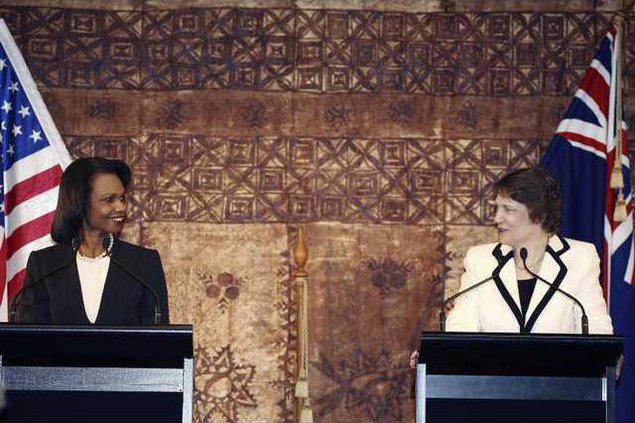AUCKLAND, New Zealand - In a global kick to the tape, Secretary of State Condoleezza Rice is grasping for diplomatic victories before the Bush administration's exit from the world stage in January.
Too little, too late, say critics, as Rice and President Bush seek to cement a legacy beyond the unpopular Iraq war, which strained relations with Europe and the Arab world and made Americans a greater target of terrorists.
With less than six months to go in office and unfinished business with Iran, North Korea, the Middle East, Iraq and Afghanistan, Rice has embarked on a series of trips and is packing in an impressive number of high-level meetings in Washington.
In June and July, Rice circled the planet twice for talks on those issues. In the first three days of the week ahead, she will see top officials from Pakistan, China, Israel and Italy as well as Israeli and Palestinian peace negotiators.
Rice will press Pakistan's prime minister to do more to combat militants along the Afghan border; seek additional support from China on Iran and North Korea; and assess the slow pace of progress in the effort to conclude an Israel-Palestinian deal by year's end. Prospects for achieving any of those are uncertain.
Administration officials are fond of saying Bush wants to "sprint to the finish." Perhaps no other Cabinet member has logged more travel time in that endeavor than Rice who returns from her latest round-the-world jaunt on Monday and heads immediately into her Washington meetings.
That nine-day excursion was marked by unprecedented but inconclusive overtures to Iran and North Korea — the remaining two charter members of Bush's "axis of evil" — and began in the Persian Gulf before Singapore for an Asian security forum, then Australia, New Zealand and American Samoa.
It came on the heels of a trip to Europe, where she signed a missile defense treaty in the Czech Republic and visited Georgia in a show of support for a NATO aspirant locked in a tense feud with Russia over separatist areas.
That was preceded by another globe-circling tour that started in Europe with a Palestinian security conference and ended in China after stops in Japan and South Korea that were focused on North Korea and a dispute over U.S. beef imports.
Although she'll take a brief break in the first week of August, she will then return to China to head up the official U.S. delegation to the closing ceremonies of the Beijing Olympic Games. Her schedule for September is not finalized but shows no sign of a letup.
Asked Saturday in New Zealand when she plans to slow down, Rice replied with a laugh: "January 20th, 12:01," referring to the exact time the next president will be inaugurated.
The spate of recent long-distance trips has put Rice on track to become one of the most traveled secretaries of state in U.S. history, according to State Department officials.
Her frenetic pace over the past two months has coincided with the heating up of the 2008 presidential campaign in which foreign policy has become a main point of contention between presumptive Democratic nominee Barack Obama and Republican hopeful John McCain.
And, it comes as Bush steps up efforts to secure nonmilitary foreign policy achievements to mark his eight years, particularly dealing with the Iranian and North Korean nuclear programs and reaching at least some form of peace deal between Israel and the Palestinians.
The past two weeks have seen the administration make several remarkable breaks in past policy: sending a top diplomat to a meeting with Iran's nuclear negotiator and having Rice, while in Singapore, meet for the first time with North Korea's foreign minister.
Although neither produced breakthroughs, the meetings have been seen by many as important policy shifts that will boost confidence in Bush's insistence that he wants to deal with both countries diplomatically.

